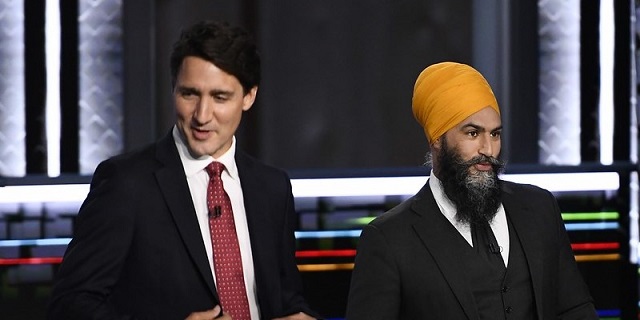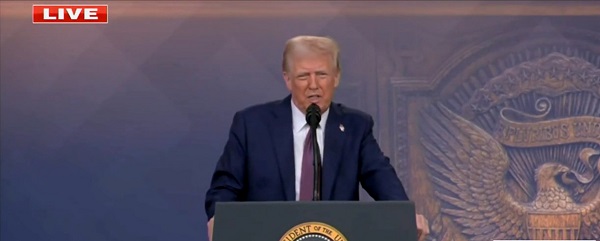Economy
Federal carbon tax hike will hurt future generations

From the Fraser Institute
” since 2005, emissions from China increased by a staggering 71.7 per cent. It’s absurd to think that, even if Canada could drive it’s GHG emissions to zero, there would be any measurable impact on the global climate. “
Despite calls from seven of Canada’s premiers (including one premier from his own party) to scrap the upcoming carbon tax hike, and the threat of a non-confidence vote by the Opposition in Parliament, Prime Minister Trudeau has doubled down as he tries to convince Canadians that somehow this tax, which is set to rise from $65 per tonne of greenhouse gas emissions (GHG) to $80/tonne on April 1, will really be good for them.
Speaking with reporters in Calgary (not coincidentally Premier Danielle Smith’s backyard), the prime minister said, “My job is not to be popular,” adding “My job is to do the right things for Canada now and do the right things for Canadians a generation from now” to “deliver that better future one generation from now, two generations from now.”
But Trudeau’s argument that somehow GHG reductions, which might stem from Canada’s carbon tax, will yield appreciable benefits of any kind—economic or environmental—now or in future is nonsense.
Why?
Because Canada’s share of global GHG emissions is slowly declining and small relative to the world’s larger emitters particularly China. Indeed, in 2021 Canada’s emissions comprised 1.5 per cent of global GHG emissions compared to 26 per cent for China (in 2018). And since 2005, emissions from China increased by a staggering 71.7 per cent. It’s absurd to think that, even if Canada could drive it’s GHG emissions to zero, there would be any measurable impact on the global climate. And no impact on climate means no improved environmental benefits for future generations.
Economically, the prime minister’s argument is even less compelling than the proclaimed environmental benefit. According to a study published by the Fraser Institute, implementing a $170 carbon tax would shrink Canada’s economy by 1.8 per cent and produce significant job losses and reduced real income in every province.
The cadre of Trudeau government policies, including the carbon tax and imposition of federal bills C-48 (which bans large oil tankers carrying crude oil off British Columbia’s north coast, limiting access to Asian markets) and C-69 (which introduces subjective criteria including the “social impact” of energy investment into the evaluation process of major energy projects), combined with impending regulations such as GHG emission caps, are contributing to a collapse in business investment and ultimately economic stagnation in Canada. Per-person gross domestic product (GDP)—a broad measure of living standards—has barely budged in the last nine years and in fact stood in 2014 at $58,162, which is $51 higher than at the end of 2023 (inflation-adjusted). In other words, living standards for Canadians have declined.
Capital investment, which contributes to economic growth and higher living standards, is also declining. A 2021 Fraser Institute study showed that the growth rate of overall capital expenditures in Canada slowed substantially from 2005 to 2019, and the growth rate from 2015 to 2019 was lower than in virtually any other period since 1970. Moreover, as recently as 2000 to 2010, overall capital investment in Canada enjoyed a substantially higher growth rate than in other developed countries, but from 2010 to 2019, Canada’s investment growth rate dropped substantially below that of the United States and many other developed countries. Corporate investment in Canada as a share of total investment was also the lowest among a set of developed countries from 2005 to 2019.
Far from delivering environmental or economic benefits for Canadians “one generation from now” or “two generations from now,” Prime Minister Trudeau’s policies have thrown serious shadows over the future economic prospects of Canadians who will find themselves less well-off and less economically capable of adapting to predicted climate risks whether manmade or natural.
Author:
Business
Americans rallying behind Trump’s tariffs

The Trump administration’s new tariffs are working:
The European Union will delay tariffs on U.S. exports into the trading bloc in response to the imposition of tariffs on European aluminum and steal, a measure announced in February by the White House as a part of an overhaul of the U.S. trade policies.
Instead of taking effect March 12, these tariffs will not apply until “mid-April”, according to a European official interviewed by The Hill.
This is not the first time the EU has responded this way to U.S. tariff measures. It happened already last time Trump was in office. One of the reasons why Brussels is so accommodative is that the European Parliament emphasized negotiations already back in February. Furthermore, as Forbes notes,
The U.S. economy is the largest in the world, and many countries rely on American consumers to buy their goods. By import tariffs, the U.S. can pressure trading partners into more favorable deals and protect domestic industries from unfair competition.
More on unfair competition in a moment. First, it is important to note that Trump did not start this trade skirmish. Please note what IndustryWeek reported back in 2018:
Trump points to U.S. auto exports to Europe, saying they are taxed at a higher rate than European exports to the United States. Here, facts do offer Trump some support: U.S. autos face duties of 10% while European cars are subject to dugies of only 2.5% in the United States.
They also noted some nuances, e.g., that the United States applies a higher tariff on light trucks, presumably to defend the most profitable vehicles rolling out of U.S. based manufacturing plants. Nevertheless, the story that most media outlets do not tell is that Europe has a history of putting tariffs on U.S. exports to a greater extent than tariffs are applied in the opposite direction.
Larson’s Political Economy is a reader-supported publication.
To receive new posts and support my work, consider becoming a free or paid subscriber.
Facts notwithstanding, this trade war has caught media attention and is reaching ridiculous proportions. According to CNBC,
Auto stocks are digesting President Donald Trump’s annoncement that he would place 25% tariffs on “all cars that are not made in the United Sates,” as well as certain automobile parts. … Shares of the “Detroit Three” all fell.
They also explain that GM took a particularly hard beating, and that Ferrari is going to use the tariffs as a reason to raise prices by ten percent. This sounds dramatic, but keep in mind that stocks fly up and down with impressive amplitude; what was lost yesterday can come back with a bonus tomorrow. As for Ferrari, a ten-percent price hike is basically meaningless since these cars are often sold in highly customized, individual negotiations before they are even produced.
Despite the media hype, these tariffs will not last the year. One reason is the retaliatory nature in President Trump’s tariffs, which—again—has already caught the attention of the Europeans and brought them to the negotiation table. We can debate whether or not his tactics are the best in order to create more fair trade terms between the United States and our trading partners, but there is no question that Trump’s methods have caught the attention of the powers that be (which include Mexico and Canada).
There is another reason why I do not see this tariffs tit-for-tat continuing for much longer. The European economy is in bad shape, especially compared to the U.S. economy. With European corporations already signaling increased direct investment in the U.S. economy, Europe is holding the short end of this stick.
But the bad news for the Europeans does not stop there. They are at an intrinsic disadvantage going into a tariffs-based trade war. The EU has a “tariff” of sorts that we do not have, namely the value-added tax, VAT. Shiphub.co has a succinct summary of how the VAT affects trade:
When importing (into the European Union), VAT should be taken into account. … VAT is calculated based on the customs value (the good’s value and transport costs … ) plus the due duty amount.
The term “duty” here, of course, refers to trade tariffs. This means that when tariffs go up, the VAT surcharge goes up as well. Aside from creating a tax-on-tax problem, this also means that the inflationary effect from U.S. imports is significantly stronger than it is on EU imports to the United States—even when tariffs are equal.
If the U.S. government wanted to, they could include the tax-on-tax effect of the VAT when assessing the effective EU tariffs on imports from the United States. This would quickly expand the tit-for-tat tariff war, with Europe at an escalating disadvantage.
For these reasons, I do not see how this “trade war” will continue beyond the summer, but even that is a pessimistic outlook.
Before I close this tariff topic and declare it a weekend, let me also mention that the use of tariffs in trade war is neither a new nor an unusual tactic. Check out this little brochure from the Directorate-General for Trade under the European Commission’:
Trade defence instruments, such as anti-dumping or anti-subsidy duties, are ways of protecting European production against international trade distortions.
What they refer to as “defence instruments” are primarily tariffs on imports. In a separate report the Directorate lists no fewer than 63 trade-war cases where the EU imposes tariffs to punish a country for unfair trade tactics.
Trade what, and what countries, you wonder? Sweet corn from Thailand, fused alumina from China, biodiesel from Argentina and Indonesia, malleable tube fittings from China and Thailand, epoxy resins from China, South Korea, Taiwan, and Thailand… and lots and lots of tableware from China.
Like most people, I would prefer a world without taxes and tariffs, and the closer we can get to zero on either of those, the better. But until we get there, we should take a deep breath in the face of the media hype and trust our president on this one.
Larson’s Political Economy is a reader-supported publication.
To receive new posts and support my work, consider becoming a free or paid subscriber.
Business
Trump Reportedly Shuts Off Flow Of Taxpayer Dollars Into World Trade Organization


From the Daily Caller News Foundation
By Thomas English
The Trump administration has reportedly suspended financial contributions to the World Trade Organization (WTO) as of Thursday.
The decision comes as part of a broader shift by President Donald Trump to distance the U.S. from international institutions perceived to undermine American sovereignty or misallocate taxpayer dollars. U.S. funding for both 2024 and 2025 has been halted, amounting to roughly 11% of the WTO’s annual operating budget, with the organization’s total 2024 budget amounting to roughly $232 million, according to Reuters.
“Why is it that China, for decades, and with a population much bigger than ours, is paying a tiny fraction of [dollars] to The World Health Organization, The United Nations and, worst of all, The World Trade Organization, where they are considered a so-called ‘developing country’ and are therefore given massive advantages over The United States, and everyone else?” Trump wrote in May 2020.
The president has long criticized the WTO for what he sees as judicial overreach and systemic bias against the U.S. in trade disputes. Trump previously paralyzed the organization’s top appeals body in 2019 by blocking judicial appointments, rendering the WTO’s core dispute resolution mechanism largely inoperative.
But a major sticking point continues to be China’s continued classification as a “developing country” at the WTO — a designation that entitles Beijing to a host of special trade and financial privileges. Despite being the world’s second-largest economy, China receives extended compliance timelines, reduced dues and billions in World Bank loans usually reserved for poorer nations.
The Wilson Center, an international affairs-oriented think tank, previously slammed the status as an outdated loophole benefitting an economic superpower at the expense of developed democracies. The Trump administration echoed this criticism behind closed doors during WTO budget meetings in early March, according to Reuters.
The U.S. is reportedly not withdrawing from the WTO outright, but the funding freeze is likely to trigger diplomatic and economic groaning. WTO rules allow for punitive measures against non-paying member states, though the body’s weakened legal apparatus may limit enforcement capacity.
Trump has already withdrawn from the World Health Organization, slashed funds to the United Nations and signaled a potential exit from other global bodies he deems “unfair” to U.S. interests.
-

 Alberta2 days ago
Alberta2 days agoAlberta Institute urging Premier Smith to follow Saskatchewan and drop Industrial Carbon Tax
-

 Addictions2 days ago
Addictions2 days agoShould fentanyl dealers face manslaughter charges for fatal overdoses?
-

 Also Interesting1 day ago
Also Interesting1 day agoThe bizarre story of Taro Tsujimoto
-

 Alberta2 days ago
Alberta2 days agoAlbertans have contributed $53.6 billion to the retirement of Canadians in other provinces
-

 2025 Federal Election2 days ago
2025 Federal Election2 days agoChinese Gangs Dominate Canada: Why Will Voters Give Liberals Another Term?
-

 Health1 day ago
Health1 day agoRFK Jr. Drops Stunning Vaccine Announcement
-

 Energy2 days ago
Energy2 days agoEnergy, climate, and economics — A smarter path for Canada
-

 2025 Federal Election22 hours ago
2025 Federal Election22 hours agoSoaked, Angry, and Awake: What We Saw at Pierre Poilievre’s Surrey Rally






